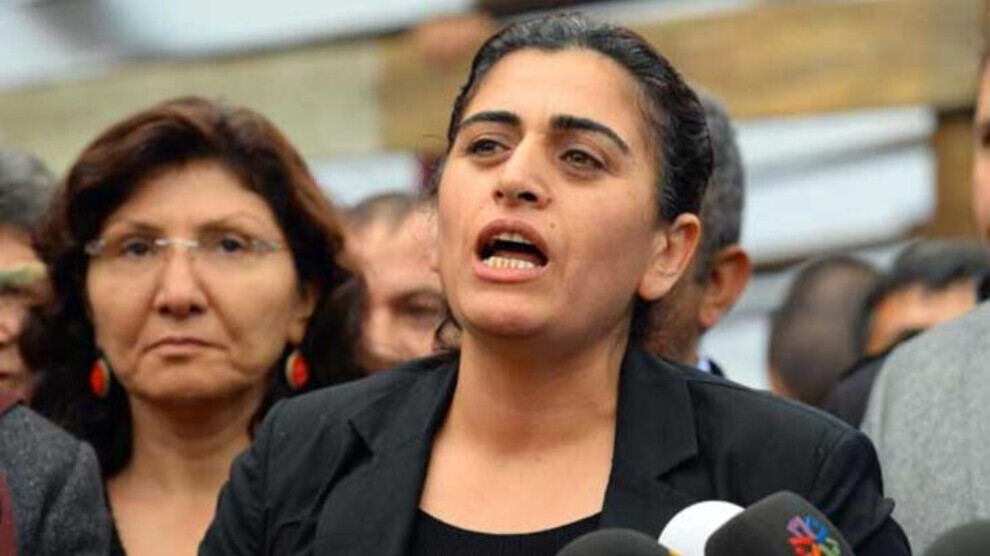Tuncel: Turkey's prisons are internment camps for Kurds
Former co-chair of the Party of Democratic Regions (DBP), Sebahat Tuncel, has been held hostage in a Turkish prison since 6 November 2016.
Former co-chair of the Party of Democratic Regions (DBP), Sebahat Tuncel, has been held hostage in a Turkish prison since 6 November 2016.

Former co-chair of the Party of Democratic Regions (DBP), Sebahat Tuncel, has been held hostage in a Turkish prison since 6 November 2016.
A verdict of fifteen years imprisonment handed down against her in 2019 on terrorism allegations was received by a court of appeals for formal errors, but a new arrest warrant was recently issued against her as part of the so-called “Kobanê investigation”.
ANF had the opportunity to have a written interview with Sebahat Tuncel through her lawyer.
Tuncel spoke about the arrest warrant recently issued against her for the so called “Kobanê protests” which took place six years ago, and explained why she thinks the preliminary investigation has been started right now.
Tuncel said:
"The so-called “Kobanê investigation” and the arrests that go with it are the result of the anti-Kurdish practice of the fascist AKP / MHP government. The People's Alliance [an electoral alliance that has existed since 2018 for the presidential and parliamentary elections between the Islamist AKP and the right-wing extremist ultra-nationalist MHP] uses all its weight to prevent the participation of the Kurds in the definition of new power relations and balance, and thus implicitly calls the Kurdish status into question.
The anti-Kurdish line is at the center of government action, both internally and externally. When the AKP launched an annihilation plan against Kurdish society with its ‘destruction plan’ in 2014, we were in the middle of a peace process. Parallel to the talks with Abdullah Öcalan in the Imrali prison island, the Turkish state also sat at the table with the HDP delegation for a peaceful solution to the Kurdish question.
With the “Dolmabahçe Agreement” [ten-point plan that set out the framework for the peace negotiations between the Turkish state and the PKK] as a result of the political talks, an important step in the transition from dialogue was taken towards direct negotiations. But Erdoğan overturned the table and increased Abdullah Öcalan's isolation. In doing so, he has ensured that Öcalan's views and suggestions do not reach society.
The unresolved Kurdish question and this escalation policy, which is geared towards war and conflict, have put Turkey economically and politically in a position of chaos. During this phase, the AKP used the controlled coup attempt of July 2016 to crack down on social opposition, to organize a witch hunt against all "enemies", to cash in the powers of the constitutional organs and to create a presidential system in the constitution by abolishing the parliamentary system of government anchored in order to institutionalize the “one-man regime” in this way.
An omnipresent mechanism of repression was set in motion against the democratic opposition, but especially against the Kurdish people. This repression reached its climax with the policy of dismissing the legally and freely elected mayors and administrators. The political will of the Kurdish people has been usurped by the trusteeship regime, and the arrest of elected mayors, party leaders and thousands of functionaries from the HDP / DBP structures.
This process continues to this day. The country's prisons have been established as internment camps for Kurds. The investigations into the Kobanê protests and the arrests six years after the incidents basically reflect the AKP's vengeful attitude towards the Kurdish people. When we look back on that time, we remember that the government supported ISIS and other radical groups in every way possible to undermine the achievements of the Kurdish people in Rojava. The whole world is aware of this fact, and many states have documents that prove this support.
Despite the support of the Turkish state, the Kurdish people put up an admirable resistance and defeated the murderous ISIS mercenaries who committed crimes against humanity. Around the world people showed their solidarity to this resistance, because the fight for Kobanê created a new hope for all peoples of this planet.
November 1st was declared World Kobanê Day. At the time, the AKP was furious that the solidarity of the international community was aimed at the Kobanê resistance. Because it was the people of Kobanê and the Kurdish people who won - the losers were the AKP and its politics. Even if the AKP repeatedly assures that it is against IS, its practice shows that the exact opposite is the case. When Recep Tayyip Erdoğan said with sufficient satisfaction in a speech in Gaziantep during the defensive battle against the siege of Kobanê in October 2014 that the city was “about to fall”, he expressed his true wish."